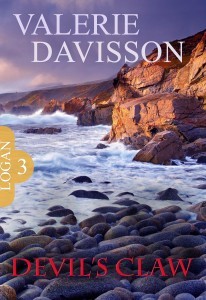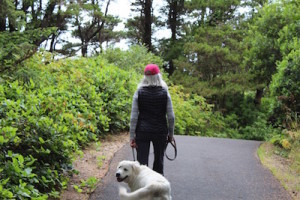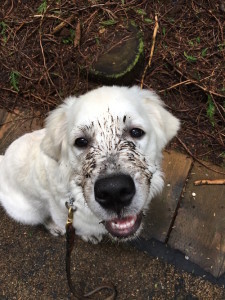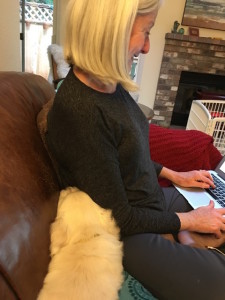Valerie Davisson's Blog, page 6
August 3, 2018
Fun with Finn
ALL WORK AND NO PLAY makes Jill a dull girl, so I look forward to playing with my new best bud, Finn, our 7-month-old English Cream Golden Retriever. He is such a delight.
It took me forever to name him, but when our grandson Sawyer was born on the same day, Finn for Huckleberry just had to be his name. We have acres of forest in our back yard, and he loves every inch of it. He also loves getting wet in any water available – ocean, river, mud puddle…he’s not picky.
And when I do settle down to write, he nuzzles up for a good nap  Love having a dog again!
Love having a dog again!
July 13, 2018
The Inside Scoop
EVER WONDER HOW YOUR WRITING COMPARES to famous authors? Whether you are a working author, or someone who would like to be, who wouldn’t want to know how they measured up to Stephen King, Maya Angelou, Barbara Kingsolver, Arthur Conan Doyle, Norman Mailer, or W. Somerset Maughan?
While you may not be able to compare quality of content, you can compare quantity, at least as measured in daily word counts. When I began writing, I’d never heard of a daily word count goal, but believe me, without one, you’re probably never going to finish that novel that’s been sitting on your desktop for the last couple of months…or years.
And if setting a word count goal sounds sterile and unartistic, not something a true writer would need to or want to do, keep reading. You’ll be surprised.
I found this little gem online. Amanda Peterson of Writers Write gives us a glimpse into the daily word counts of almost forty authors, old and new. I’ll never fall into Michael Crichton’s 10,000 words a day territory, but was happy to be keeping company with Jack London, Stephen King, and Barbara Kingsolver.
The Daily Word Counts of 39 Famous Authors by Amanda Peterson of Writers Write
January 24, 2018
Stepping Up Your Game
HOW DO YOU WRITE A BOOK? In one form or another, this is the question I often get asked. How do you think up characters? How do you keep all the story lines straight? But the main question people ask is how do you find the time? How do you fit writing into your life? Because, whether you work a day job or are fortunate enough to write full time, it’s still a challenge.
We just leaped into a New Year, so, if you’ve always wanted to write a book, but weren’t sure where to begin…start with a production schedule. With my first couple of books, I set daily and weekly word-count goals, which kept me on track and got the job done, but I’ve recently stepped up my game by creating a true production schedule to include all aspects leading up to the book launch.
Gleaned from webinars, writing sites, and many other resources, I recently created one for the book I’m currently working on, and shared it in a guest post on the O.C. Writers site. (Thanks to Meghan for the invite. Always great working with you.) Writing may be a solitary task, and having a production schedule doesn’t mean you will complete your book, but it just may give you the edge you’re looking for. 2018 is Your Year!
STEPPING UP YOUR 2018 by Valerie Davisson
November 29, 2017
MEET THE AUTHOR
Stop by this Sunday and say hello! I’ll be at the Newport Public Library at 35 NW Nye Street, Newport, OR from 1-3 PM. I’ll be there with other local authors for a meet and greet.
Thank You to Carrol Caldwell designs and Nicole at Hauser Publishing for the awesome signage!
I’ll also have my non-fiction title, SATURDAY SALON: Bringing Conversation and Community Back Into Our Lives at this event.
See You There!
NEWPORT AUTHOR FAIR
IF YOU’RE GOING TO BE IN NEWPORT, OR this Sunday, come on by and say hello. I’ll have all three of the Logan McKenna Mystery/Thriller series titles available, as well as my non-fiction title, SATURDAY SALON: Bringing Conversation and Community Back Into Our Lives. And I can’t wait to meet the other authors in my new neighborhood, too!
July 22, 2017
The Book Review
ALL WRITERS NEED REVIEWS. They are essential for sales, of course, but they are also a great source for information as you’re working on your next book. Writing is a craft, and just because you have a natural talent for it doesn’t mean your skills can’t improve. All good writers continue to polish their skills. We can’t be too proud to listen to valid criticism.
So, once you get a few reviews, how do you use them?
Reviews reveal what elements of your book connected with readers and what didn’t work for them. But, remember that each reviewer is unique. They may love or hate your book for reasons that have nothing to do with your writing. You can’t take it personally if a 20-year-old reader who adores vampires and sci-fi doesn’t like your book about an aging, alcoholic detective. Nor can you totally believe your mother’s assessment that you are the next John Grisham. So, I go by the 90/10 rule.
Looking at all of your reviews, probably 90% are valid and useful. Your family and friends are all going to give you 5 stars, even if you didn’t write War and Peace. On the other end of the spectrum, trolls, frustrated writers, and people who probably should not have had that last glass of wine before they hit ‘Post’ delight in lancing you with 1 or 2 stars with lengthy rants about why you should never be allowed near a keyboard again.
But, the majority of reviewers leave an honest review. If 90% of my reviews say they love my main character, dialogue and descriptions, or how I weave several plot lines together – if I see those compliments showing up in every review – I can feel confident that I’m on the right track in those areas. By the same token, I pay attention if several readers say they would have liked the action to come sooner in the book. But remember, it’s still your book, so if readers want to see more sex or more violence and that’s not your thing, you don’t have to change it. You just need to find readers who like your type of book.
So, how do you find them? Whether you are 100% self-published, went the hybrid-publishing route, or got picked up by a publisher, you will still need to do a lot of marketing, including finding reviewers. Amazon’s http://authormarketingclub.com has a ReviewGrabber tool that’s worth the price of admission. Divvy up the work with your publisher, find an intern to help, or dedicate an hour a day and start tracking down reviewers who like your kind of book.
The ReviewGrabber tool allows you to find Amazon reviewers who have already reviewed books in your genre. You can even search by author or book title. I am just beginning to use this tool and love it so far. You will have much better luck in finding people who want to review your book AND will potentially like it, if you see they have read and reviewed several other books like yours. The site has many other great marketing ideas for new writers and publishers.
Sometimes the shoe is on the other foot. I am often asked to review someone else’s book. If it’s a good story, well-written, no major flaws, I’ll give it a 4. If I love it, I’ll give it a 5. If I don’t like a book I’ve read, I don’t leave a bad review. If the author has asked me for my honest opinion, I will privately email or message them to tell them what I think could be improved. Most writers value honest feedback, which includes criticism as well as praise.
We all have a chance to be reviewers when we finish reading a book. I used to skip that page, but now that I understand the value of readers’ comments, I always leave at least a few sentences describing the book for anyone deciding whether or not to buy it, and what I liked.
So, whether you’re pounding out the last 100 pages of your next novel, writing a review for someone, or browsing for a new beach read, here’s to a 5-Star Summer!
July 10, 2017
Sneak Peek!
CHECK OUT THE COVER for the new book, the third in my Logan McKenna Mystery/Thriller series. I had so much fun writing this one. It brings Logan back to Jasper, her Southern California coastal home town. Here’s a peek…
It’s summer, and with a new job, a new love, and plenty of time for her music, life is good.
After rescuing an orphaned otter pup on a morning beach walk, Logan and her daughter, Amy, home from Africa, help nurse it back to health at the new Southern Sea Otter Center. But powerful storm clouds soon swirl around the center, threatening the lives of all who touch it. More than one person lays claim to the property, and the stakes are high. Each wants it badly, but for very different reasons.
With no resolution in sight, death soon dominates the calendar, exposing deep layers of deceit, greed, and painful, personal loss. The sharks in the water are dangerous, but the land predators, more numerous and deadly. Logan and those she loves must face the raging storm, using everything they’ve got, to stop the killer, before more lives are lost.
Amazon reviews are pure gold, so if you purchased one of the first two books, SHATTERED: Logan Book 1, or FOREST PARK: Logan Book 2, a short review would really be appreciated.
Thank you to those readers who have already left great reviews!
New Cover! Free Book!
 CHECK OUT THE COVER for the new book, the third in my Logan McKenna Mystery/Thriller series. I had so much fun writing this one. It brings Logan back to Jasper, her Southern California coastal home town. Here’s a peek…
CHECK OUT THE COVER for the new book, the third in my Logan McKenna Mystery/Thriller series. I had so much fun writing this one. It brings Logan back to Jasper, her Southern California coastal home town. Here’s a peek…
It’s summer, and with a new job, a new love, and plenty of time for her music, life is good.
After rescuing an orphaned otter pup on a morning beach walk, Logan and her daughter, Amy, home from Africa, help nurse it back to health at the new Southern Sea Otter Center. But powerful storm clouds soon swirl around the center, threatening the lives of all who touch it. More than one person lays claim to the property, and the stakes are high. Each wants it badly, but for very different reasons.
With no resolution in sight, death soon dominates the calendar, exposing deep layers of deceit, greed, and painful, personal loss. The sharks in the water are dangerous, but the land predators, more numerous and deadly. Logan and those she loves must face the raging storm, using everything they’ve got, to stop the killer, before more lives are lost.
Amazon reviews are pure gold, so if you purchase one of the first two books, SHATTERED: Logan Book 1, or FOREST PARK: Logan Book 2, anytime in July or August, and write a short review on Amazon, the publisher will send you a FREE Kindle copy of DEVIL’S CLAW: Logan Book 3 when it comes out this Fall. Just zip me an email in the contact page, or through Facebook or Twitter and I’ll make it happen!
Thank you to those readers who have already left great reviews!
April 12, 2017
The Love Scene
WRITING A LOVE SCENE IS TOUGH! In this book, the third in my Logan McKenna series, I’m trying to hit the right balance: sensual, but not graphic, and definitely not bodice-ripping romance novel stuff. I’m aiming for enough passion to make you want to go hunt down your partner, but not enough detail to help you pass an anatomy class.
Lovemaking can be playful, quick, searching, fulfilling, frustrating, passionate, soul rocking, or all of the above. I love writing about how real passion often sneaks up on us – happening at odd moments of intense emotions that manifest in our bodies, not necessarily the rose petals on the bed, preplanned rendezvous.
Writing about sex for its own sake doesn’t interest me. It’s been done to death. If we all don’t know by now what a climax feels like, well…see a doctor. And I refuse to throw in gratuitous, graphic scenes just to make my novels seem more ‘gritty’ or ‘real’.
Lovemaking is very real and much more interesting than mere sex.
My protagonist, Logan McKenna, is in her early forties, beyond the flutterings and fumbling of youth. She and her neighbor, Ben, have histories, trust issues, and broken hearts, but they also know who they are and increasingly, what they want. Could they have found it in each other? Will it last?
There’s nothing more powerful than two strong, loving people coming together. I’m having fun seeing what happens with these two.
February 22, 2017
LOVE
BIG TOPIC TO COVER in 1000 words or less. We’ve heard all the songs, seen all the bumper stickers, and put up all the posters in our dorm rooms. All we need is love. Love conquers all. But what is love, and, how, as authors, do we deal with it in our writing?
Maybe you think you don’t need to. Maybe you think love is only a subject with which Romance Novelists need to concern themselves.
“I write Thrillers,” you say, ” or Science, History, French, Philosophy, or Underwater Basketweaving.”
But I’m here to propose (pardon the romantic reference) that Love infuses and is the foundation for all writing. Not only is writing an act of love, but I dare you to pick up a book – any book – and not find human connection, dis-connection, or passion in it. Love, or the lack of it, is why we do what we do, be we scientists or fictional characters.
It’s Everywhere
An excellent example of passionate non-fiction writing is Sam Kean’s book, The Disappearing Spoon: And Other True Tales of Madness, Love, And the History of the World from the Periodic Table of the Elements. Powerful stuff!
If you are that Mystery/Thriller, Sci-Fi, or other novelist, maybe you’ve gotten lazy about love, throwing in a gratuitous, shallow romantic story line for your main character that doesn’t go any deeper than your typical sitcom, just to check that box. But you can do better than that.
Every character is motivated by love or a lack of love – although not always romantic love. Understand your characters’ motives, and the writing, particularly the dialogue, will just flow naturally from your fingers.
Challenge
Looking for love in all the right places is a good start. My February writing challenge – to you and myself- is to go back to Creative Writing 101 and do the coffee shop exercise. Take a trip to a Starbucks, a school board meeting, a courtroom, a gas station, Nordstrom, or Denny’s – wherever people are. Plop yourself down someplace and observe. What do they say? What do they do? Who is connected to who? Who’s mad at someone who’s not there? Who is sharing good news? Who’s alone?
I vaguely remembered Plato’s various categories of love, Googled it and here’s a summary for us to use as a guideline while on our February People Watching Mission:
EROS – Passion
Obvious one. Sexual or Passionate Love. Cupid and Valentine’s cards. Bodice-ripping, devil-be-damned passion! Opposed to Logos or Reason. Eros is why Paris fell for Helen of Troy, and Clinton risked his political career for “That Woman”. This is the easy, go-to type of love, that most novelists include in their stories. Nothing wrong with that. It’s a powerful motivation – our main character either does something dramatic to gain eros, or does something out of hurt, anger and pain because EROS was lost.
STORGE – Parental
A type of love often mined by novelists for their bad guy, is the love between parent and child. Most serial killers have some sort of twisted relationship with their parents. They didn’t get much STORGE. A lack of parental love causes a deep hole in which evil ferments. In its positive form, STORGE is universal and broad – providing a solid foundation from which our healthier characters draw in times of trial. Much mined, but always interesting, parent-child love is a rich source of drama for our characters.
PHILIA – Friendship
In my books, Logan McKenna is motivated to fight for her friends, new or old, because she is blessed with a few good friends – those ties that sustain us even when we may be lacking in other forms of love at that stage in our lives. With true friendship, there is a sense of shared goodwill. We value those with whom we can completely be ourselves, and trust. If you are writing a series, take a look at your main character’s romantic relationship – there is usually a combination, and a changing ratio of EROS and PHILIA. What does your main character need? What does their love interest need? How do they attempt to meet each others’ needs? Are they successful? If they are getting 80% of what they need, is that enough?
AGAPE – Universal
Mother Teresa. Gandhi. Christ. St. Francis of Assisi? Buddha? Carl Sagan? Whoever is on your list of candidates, their lives would exhibit an unselfish concern for the welfare of others. Not sure many characters in novels would qualify for this level of love – and if they did, they wouldn’t make very interesting characters. Like sitting on a cloud, playing a harp – it might make for a boring book if you knew your main character was always right, always good, always giving. No drama there. It would be great if the world were full of Agape, but the best we can do is to show that our characters are capable of bursts of this kind of love, reaching for it, attempting to live it, stumbling, then either giving up or getting back up again.
So, back to our people watching session. Take a look at your notes. What kinds of love show themselves, or are hidden under actions and conversations? Which ring true for your characters? Which conflicts are the most intriguing to you? Whatever you feel and see.
That is real. That is human.
That’s a good book!






